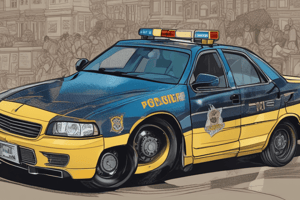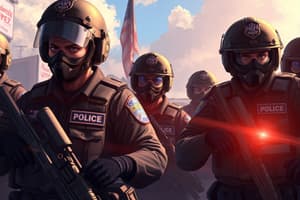Podcast
Questions and Answers
What is the primary reason for establishing rules?
What is the primary reason for establishing rules?
Where are rules commonly enforced?
Where are rules commonly enforced?
Which of the following is an example of a rule that might be enforced in a library?
Which of the following is an example of a rule that might be enforced in a library?
What often happens when someone breaks a rule?
What often happens when someone breaks a rule?
Signup and view all the answers
During an AFL game, what is specifically prohibited regarding tackling?
During an AFL game, what is specifically prohibited regarding tackling?
Signup and view all the answers
What is the main purpose of laws?
What is the main purpose of laws?
Signup and view all the answers
What can be a consequence of breaking a law?
What can be a consequence of breaking a law?
Signup and view all the answers
Where are laws typically enforced?
Where are laws typically enforced?
Signup and view all the answers
Which of the following is NOT an example of a law?
Which of the following is NOT an example of a law?
Signup and view all the answers
Who is responsible for making and enforcing laws?
Who is responsible for making and enforcing laws?
Signup and view all the answers
What is a defining characteristic of a strong democracy?
What is a defining characteristic of a strong democracy?
Signup and view all the answers
Which of the following is NOT a special feature of democracy in Australia?
Which of the following is NOT a special feature of democracy in Australia?
Signup and view all the answers
How can citizens participate in their democracy?
How can citizens participate in their democracy?
Signup and view all the answers
What happens when citizens do not participate in a democracy?
What happens when citizens do not participate in a democracy?
Signup and view all the answers
What right does being a citizen typically grant?
What right does being a citizen typically grant?
Signup and view all the answers
What does consent mean in the context of a democracy?
What does consent mean in the context of a democracy?
Signup and view all the answers
Which of the following is a key feature of a democracy?
Which of the following is a key feature of a democracy?
Signup and view all the answers
What is the role of laws in a democracy?
What is the role of laws in a democracy?
Signup and view all the answers
Which type of democracy allows all voters to have a direct say in decisions?
Which type of democracy allows all voters to have a direct say in decisions?
Signup and view all the answers
In a democracy, how are the human rights of citizens treated?
In a democracy, how are the human rights of citizens treated?
Signup and view all the answers
What is a defining characteristic of direct democracy?
What is a defining characteristic of direct democracy?
Signup and view all the answers
In which type of democracy do citizens elect representatives?
In which type of democracy do citizens elect representatives?
Signup and view all the answers
What is a common application of direct democracy in a classroom setting?
What is a common application of direct democracy in a classroom setting?
Signup and view all the answers
Which of the following best describes how representative democracy operates?
Which of the following best describes how representative democracy operates?
Signup and view all the answers
Which option is NOT an example of direct democracy?
Which option is NOT an example of direct democracy?
Signup and view all the answers
What is a characteristic of direct democracy?
What is a characteristic of direct democracy?
Signup and view all the answers
Which country is noted for functioning with direct democracy?
Which country is noted for functioning with direct democracy?
Signup and view all the answers
What is one potential limitation of direct democracy?
What is one potential limitation of direct democracy?
Signup and view all the answers
In a direct democracy, how often are referendums held in Switzerland?
In a direct democracy, how often are referendums held in Switzerland?
Signup and view all the answers
Which statement best describes representative democracy?
Which statement best describes representative democracy?
Signup and view all the answers
What defines a political party in the context of a representative democracy?
What defines a political party in the context of a representative democracy?
Signup and view all the answers
Which of the following is a requirement for elections in a representative democracy?
Which of the following is a requirement for elections in a representative democracy?
Signup and view all the answers
What does bribery involve in the context of elections?
What does bribery involve in the context of elections?
Signup and view all the answers
What does coercion mean in the context of elections?
What does coercion mean in the context of elections?
Signup and view all the answers
Why is it important to have more than one political party in a representative democracy?
Why is it important to have more than one political party in a representative democracy?
Signup and view all the answers
Flashcards
Purpose of laws
Purpose of laws
Laws are rules made and enforced by the government to maintain fairness and safety.
Who enforces laws?
Who enforces laws?
Various government institutions like the police and courts enforce laws.
Consequences for breaking laws
Consequences for breaking laws
Breaking a law can lead to penalties like fines or jail time.
Public places with laws
Public places with laws
Signup and view all the flashcards
Examples of laws
Examples of laws
Signup and view all the flashcards
Rules for safety
Rules for safety
Signup and view all the flashcards
Places with rules
Places with rules
Signup and view all the flashcards
Consequences of breaking rules
Consequences of breaking rules
Signup and view all the flashcards
Applying sunscreen
Applying sunscreen
Signup and view all the flashcards
AFL rules
AFL rules
Signup and view all the flashcards
What is a citizen?
What is a citizen?
Signup and view all the flashcards
What is a democracy?
What is a democracy?
Signup and view all the flashcards
Why is citizen participation important in a democracy?
Why is citizen participation important in a democracy?
Signup and view all the flashcards
What makes Australian democracy special?
What makes Australian democracy special?
Signup and view all the flashcards
How can citizens participate in Australian democracy?
How can citizens participate in Australian democracy?
Signup and view all the flashcards
Direct Democracy
Direct Democracy
Signup and view all the flashcards
Representative Democracy
Representative Democracy
Signup and view all the flashcards
How does a representative democracy work?
How does a representative democracy work?
Signup and view all the flashcards
Difference between Direct and Representative Democracy?
Difference between Direct and Representative Democracy?
Signup and view all the flashcards
Examples of Direct Democracy
Examples of Direct Democracy
Signup and view all the flashcards
Democracy
Democracy
Signup and view all the flashcards
Consent in Democracy
Consent in Democracy
Signup and view all the flashcards
Oppression vs. Democracy
Oppression vs. Democracy
Signup and view all the flashcards
Free & Fair Elections
Free & Fair Elections
Signup and view all the flashcards
Referendum
Referendum
Signup and view all the flashcards
Switzerland
Switzerland
Signup and view all the flashcards
Positives of Direct Democracy
Positives of Direct Democracy
Signup and view all the flashcards
Political Party
Political Party
Signup and view all the flashcards
Bribery
Bribery
Signup and view all the flashcards
Coercion
Coercion
Signup and view all the flashcards
Study Notes
Laws
- Laws are made for fairness and safety.
- Laws are made and enforced by the government, the police and the court system.
- If a person breaks a rule, the consequences are very serious or can include fines or going to jail.
Places Laws Are Enforced
- Schools
- Homes
- Libraries
- Sports matches
- Shopping centres
- Car parks
- Airports
- Roads
Examples Of Laws
- Do not steal from shops.
- Park your car in the correct parking spaces.
- Do not bring weapons onto a plane.
- Stop when the traffic light turns red.
- Put sunscreen on when you are outside.
- Be quiet in the library.
- Put your hand up to speak in the classroom.
- During an AFL game, do not tackle another player below the knees or above the shoulders.
Studying That Suits You
Use AI to generate personalized quizzes and flashcards to suit your learning preferences.
Description
This quiz explores the essential role of laws in society, highlighting their importance for fairness and safety. It also covers various environments where laws are enforced and provides examples of specific laws that govern behavior in different settings.




